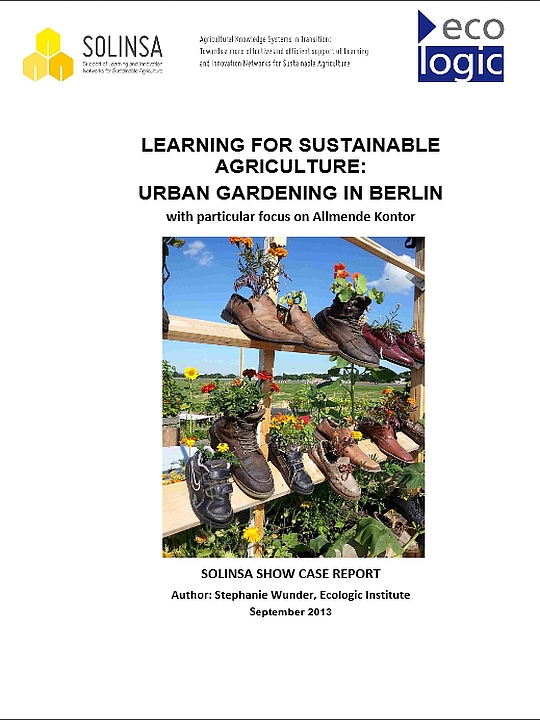Learning for Sustainable Agriculture: Urban Gardening in Berlin
- Publication
- Citation
Wunder, Stephanie 2013: Learning for Sustainable Agriculture: Urban Gardening in Berlin, Berlin.
Recent years have shown a boom of urban gardening initiatives in Berlin. Among the core motivations of many gardeners has been the wish to actively experience and contribute to sustainable agriculture. Within the European FP7 research project "SOLINSA – Support and Learning of Innovation for Sustainable Agriculture" the Ecologic Institute conducted a case study about urban gardening initiatives in Berlin, in particular the "Allmende Kontor" located on the grounds of the former Tempelhof Airport. The study, authored by Stephanie Wunder, Senior Fellow and Coordinator Agriculture at the Ecologic Institute, analyses the role that sustainability plays among other motivations in these initiatives, identifies success factors and barriers, and eventually draws conclusions about the transferability of these experiences to other regions. The study and a poster presentation are available for download.
Berlin: hot spot and the international "capital" of urban gardening
In the last decade Berlin has become a hot spot and the international "capital" of urban gardening:
In 2002 there were some eight urban gardens in Germany and none in Berlin, meanwhile (August 2013) there are more than 100 urban gardens in Berlin. This number doesn’t even include traditional allotment gardens, school gardens, children farms etc.
Manifold motivations and profoundly different exchange of knowledge and skills
The reasons why people get involved in urban gardening initiatives are manifold. However, urban gardens do share a simple principle in that they provide people without a professional agricultural background the opportunity to undertake gardening and small scale agriculture experiences. Their small size and mix of various actors result in a profoundly different exchange of knowledge and skills, bringing about different patterns than within other agricultural and gardening networks.
SOLINSA – innovation for sustainable agriculture
It is for this reason that urban gardening is an interesting case study within the European FP7 research project "SOLINSA – Support and Learning of Innovation for Sustainable Agriculture". SOLINSA aims to identify barriers and success factors to the development of so called "Learning and Innovation Networks for Sustainable Agriculture" (LINSA). Within the project different innovative and successful networks are explored. The study about contributed to the objectives outlined in the SOLINSA project by analysing urban gardening initiatives in Berlin. It focused on the following aspects:
- First, it sheds a light on how urban gardening motivates community involvement with specific reference to the development of Berlin’s urban gardening movement. It also clarifies the role of sustainability in these efforts and motivations.
- Second, it looks for the success factors as well as barriers faced; with a particular focus on the role of governance structures, knowledge sharing and decision making processes.
- Based on these observations first conclusions about the transferability of experiences to other regions and necessary preconditions are provided.
The "Allmende Kontor" – urban gardening on the former airport
The analysis relates to urban gardening in Berlin, but highlights one of the bigger initiatives in the city, the "Allmende Kontor" on the former airport Berlin-Tempelhof, that has a particular emphasis on sustainability and a strong network to other urban gardens.
The results were presented and discussed at the International Dissemination Workshop in Riga (Latvia) on 24 September 2013.



